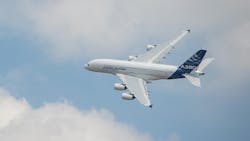The European Union failed to eliminate subsidies to planemaker Airbus Group SE that were previously found to violate trade rules, the World Trade Organization said in a ruling that opens the door to billions of dollars in sanctions against Brussels.
The finding by a WTO compliance panel Thursday strikes a blow to the EU in a long-running dispute with the U.S. over government subsidies to the world’s two largest aircraft manufacturers, Airbus and Boeing Co. The U.S. had said it would seek $10 billion in sanctions if the EU didn’t remedy illegal financing, which the trade body found in a 2011 ruling had cost Boeing (IW 500/9) plane sales and market share.
The Geneva-based WTO can’t force nations or companies to drop payments that violate trade rules, but it can authorize retaliatory measures to pressure governments into complying with its rulings. The EU can still appeal the latest decision. If it loses, the U.S. could seek sanctions. Separate cases involving assistance for Boeing remain under consideration.
What we’ve always aspired to is for Europe and Airbus to stop the practice of market-distorting launch aid."— Ted Austell, a Boeing vice president for executive, legislative and regulatory affairs
“This report is a sweeping victory for the United States and its aerospace workers,” U.S. Trade Representative Michael Froman said in a statement. “We have long maintained that EU aircraft subsidies have cost American companies tens of billions of dollars in lost revenue, which this report clearly proves.”
Airbus Plans Appeal
Airbus said an appeal by the European side would probably focus on interest-rate benchmarks for its government financing. The planemaker said the report confirmed that Europe’s chosen method of partnering with its large civil aircraft industry is acceptable under international trade law.
“We only needed to make limited changes in European policies and practices to comply,” Airbus said in an e-mailed statement. “The only open point is final ruling on the interest rate benchmark for the government loans. We are confident that we will win that point on appeal.”
The WTO panel said EU member states have failed to adequately remedy launch aid for Airbus’s A380 superjumbo, infrastructure support and equity investments that the trade body determined in 2011 had unfairly benefited the planemaker. The ruling also faulted financing not mentioned in that decision five years ago: the terms of more than $4 billion in launch aid for Airbus’s new A350 wide-body jet. According to the U.S. Trade Representative, damages totaled $22 billion.
The EU “is closely examining” the 574-page report and has found some conclusions “unsatisfactory,” a European Commission spokesperson said by e-mail. “An important win for the EU is that the panel rejected new U.S. claims that repayable support for the Airbus models A350 XWB and A380 are ‘prohibited subsidies.’ The panel has also found that all previous repayable support to other aircrafts, such as the A320, had ended.”
Longstanding Spat
The ruling marks the latest development in a decades-long spat between the close allies and trade partners over government support for large, civil aircraft manufacturing.
In 2011, the WTO determined that France, Germany, Spain, and the U.K. provided Airbus with support that ran afoul of trade rules. The EU said it reclaimed some $2.3 billion in launch-aid loans and modified the other assistance in question. The U.S. said Europe’s subsidies for the Airbus A380 remained in place and in 2012 asked a WTO compliance panel to investigate the matter.
“What we’ve always aspired to is for Europe and Airbus to stop the practice of market-distorting launch aid,” Ted Austell, a Boeing vice president for executive, legislative and regulatory affairs, said. “We would like for there to be consequences for their investment decisions.”
In a separate case, the trade organization is still determining whether Boeing and the U.S. have adequately addressed $5.3 billion in illegal aid that flowed to the Chicago-based planemaker. The EU has filed another case challenging $8.7 billion in subsidies granted by the state of Washington in 2013 in exchange for a Boeing pledge to manufacture its 777X jet in the Puget Sound region.
By Julie Johnsson and Bryce Baschuk
About the Author
Bloomberg
Licensed content from Bloomberg, copyright 2016.
